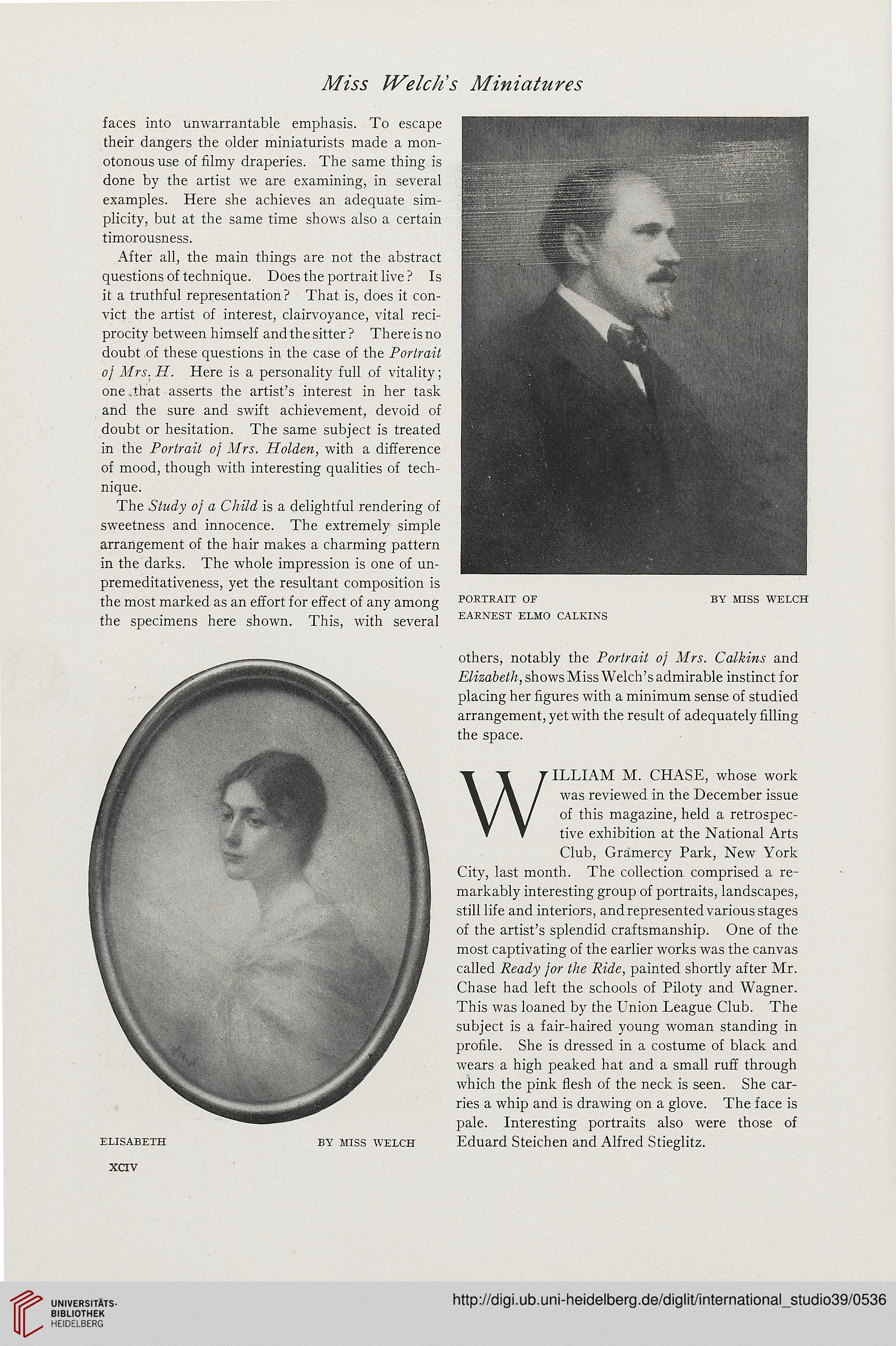Miss Welch's Miniatures
faces into unwarrantable emphasis. To escape
their dangers the older miniaturists made a mon-
otonous use of filmy draperies. The same thing is
done by the artist we are examining, in several
examples. Here she achieves an adequate sim-
plicity, but at the same time shows also a certain
timorousness.
After all, the main things are not the abstract
questions of technique. Does the portrait live? Is
it a truthful representation? That is, does it con-
vict the artist of interest, clairvoyance, vital reci-
procity between himself and the sitter? There is no
doubt of these questions in the case of the Portrait
oj Mrs. H. Here is a personality full of vitality;
one,that asserts the artist's interest in her task
and the sure and swift achievement, devoid of
doubt or hesitation. The same subject is treated
in the Portrait oj Mrs. Holden, with a difference
of mood, though with interesting qualities of tech-
nique.
The Study oj a Child is a delightful rendering of
sweetness and innocence. The extremely simple
arrangement of the hair makes a charming pattern
in the darks. The whole impression is one of un-
premeditativeness, yet the resultant composition is
the most marked as an effort for effect of any among
the specimens here shown. This, with several
ELISABETH BY MISS WELCH
XCTV
PORTRAIT OF BY MISS WELCH
EARNEST ELMO CALKINS
others, notably the Portrait oj Mrs. Calkins and
Elizabeth, shows Miss Welch's admirable instinct for
placing her figures with a minimum sense of studied
arrangement, yet with the result of adequately filling
the space.
WILLIAM M. CHASE, whose work
was reviewed in the December issue
of this magazine, held a retrospec-
tive exhibition at the National Arts
Club, Gramercy Park, New York
City, last month. The collection comprised a re-
markably interesting group of portraits, landscapes,
still life and interiors, and represented various stages
of the artist's splendid craftsmanship. One of the
most captivating of the earlier works was the canvas
called Ready jor the Ride, painted shortly after Mr.
Chase had left the schools of Piloty and Wagner.
This was loaned by the Union League Club. The
subject is a fair-haired young woman standing in
profile. She is dressed in a costume of black and
wears a high peaked hat and a small ruff through
which the pink flesh of the neck is seen. She car-
ries a whip and is drawing on a glove. The face is
pale. Interesting portraits also were those of
Eduard Steichen and Alfred Stieglitz.
faces into unwarrantable emphasis. To escape
their dangers the older miniaturists made a mon-
otonous use of filmy draperies. The same thing is
done by the artist we are examining, in several
examples. Here she achieves an adequate sim-
plicity, but at the same time shows also a certain
timorousness.
After all, the main things are not the abstract
questions of technique. Does the portrait live? Is
it a truthful representation? That is, does it con-
vict the artist of interest, clairvoyance, vital reci-
procity between himself and the sitter? There is no
doubt of these questions in the case of the Portrait
oj Mrs. H. Here is a personality full of vitality;
one,that asserts the artist's interest in her task
and the sure and swift achievement, devoid of
doubt or hesitation. The same subject is treated
in the Portrait oj Mrs. Holden, with a difference
of mood, though with interesting qualities of tech-
nique.
The Study oj a Child is a delightful rendering of
sweetness and innocence. The extremely simple
arrangement of the hair makes a charming pattern
in the darks. The whole impression is one of un-
premeditativeness, yet the resultant composition is
the most marked as an effort for effect of any among
the specimens here shown. This, with several
ELISABETH BY MISS WELCH
XCTV
PORTRAIT OF BY MISS WELCH
EARNEST ELMO CALKINS
others, notably the Portrait oj Mrs. Calkins and
Elizabeth, shows Miss Welch's admirable instinct for
placing her figures with a minimum sense of studied
arrangement, yet with the result of adequately filling
the space.
WILLIAM M. CHASE, whose work
was reviewed in the December issue
of this magazine, held a retrospec-
tive exhibition at the National Arts
Club, Gramercy Park, New York
City, last month. The collection comprised a re-
markably interesting group of portraits, landscapes,
still life and interiors, and represented various stages
of the artist's splendid craftsmanship. One of the
most captivating of the earlier works was the canvas
called Ready jor the Ride, painted shortly after Mr.
Chase had left the schools of Piloty and Wagner.
This was loaned by the Union League Club. The
subject is a fair-haired young woman standing in
profile. She is dressed in a costume of black and
wears a high peaked hat and a small ruff through
which the pink flesh of the neck is seen. She car-
ries a whip and is drawing on a glove. The face is
pale. Interesting portraits also were those of
Eduard Steichen and Alfred Stieglitz.




